Thanks very much to all of you for your kind appreciation. It has been such a pleasure listening to you, Helal. Hope we will do more work together in the near future.
Limehouse, East London. 13 March 2007. Helal Miah
This was our second recording session with the well-known Sylheti singer Helal Miah, in his Limehouse council flat in East London. Ahmed Moyez had taken us to Helal. First we met in Moyez’s Surma News office, then went to this Limehouse flat on 3 March 2007. There was Helal and his friend Ahmed Ali, the dhol player, and other friends. Helal is a second generation immigrant from Sylhet; he speaks Cockney and Sylheti, but sings in such a way that you feel as though ‘desh’ (homeland) resides in his voice. Moyez had said this—দেশের টানটা আছে তার গলায়। There was a gathering of various generations of immigrants in Helal’s flat that day; they all loved his singing.
Helal got famous after he recorded the Shah Abdul Korim song ‘Maya lagaise’ for Habib Wahid’s album, Maya (2004). The other singer on that album was Kaya, a restaurateur of East London, whom Habib had found when he wanted to record his first album Krishno (2003), a super hit in East Londoni circles and back in Bangladesh too, in which he fused traditional Bengali folk songs with techno and urban beats, electronic, hip hop, rap and reggae. While Kaya became a singer for Habib’s albums, Helal had music running through his veins.
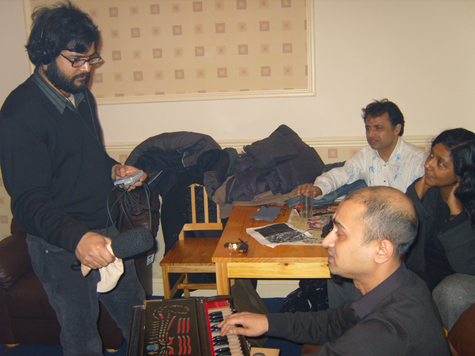
Recording Helal Miah
Helal works in the social work sector and in 2014 he is Executive Director of an organisation called The Consortium of Bengali Associations with his office on Hanbury Street, East London. I am not sure what exactly they do, but I suppose they organise events for and within the community. Each time I see Helal he says the same thing: Didi, we must do something together next time you come. You, Olly, us, Moyezbhai. You remember Ahmed Ali? Then he will pick up his phone and call Ahmed Ali and say, Hello Bhai, See who is on the line. মাতইন তান লগে। And then he will pass the phone to me.
Helal and his friends have a meeting place on Commercial Street, E1. Those three rooms are many things packed into one. Officially called the Oxford College of Sufism, it is a pool club as well as a kind of mazar or shrine where our local sufis hold their own sama sessions. We have met in this pool club-cum college of sufism—Olly (Oliver Weeks), Helal, Ahmed Ali, me, Miti (Arifa Hafiz, an East London based educator and jazz singer)—in different combinations—but ended up not doing any music, only making plans and finally going to Lahore for kebabs. In that pool club, they have a pool table of course, but also a mound of wax in one corner of a darkish room, grown from all the candles that have been lit over the years while the men sang of love, loss and longing and incense sticks burned. It is here that this lawyer friend of Helal’s explained to me the difference between Sylhet and London—I went to my desh, my country, and after a few days I felt homesick. That is my desh, this is my home. That is where I long to go, here is where I long to come back.
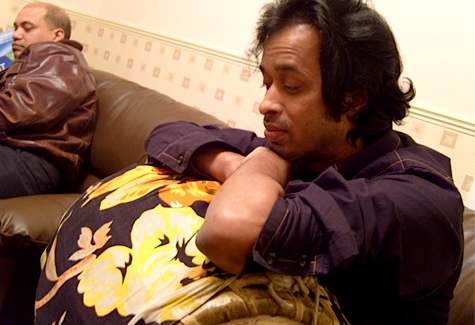
Ahmed Ali
The song from this recording session which we have uploaded is a composition of Kajol Dewan, son of the great rebel poet of Manikganj, Mataal Rajjak. (A small aside: once Kajol Dewan had got embroiled in some civil case and left Bangladesh to come and take temporary refuge in London). This song by Helal is a Bangla qawwali which means it is a form of song which is much travelled any way. It comes from lands west of the subcontinent and arrives in this eastern end as a melody and form and as a stream of stories. The song gets made in Bangladesh, then travels out, crossing the border into India; also crossing oceans to come to London. Boundaries of ‘desh’ are fluid in the making or transmission of such music. This is a song of praise to the Sufi saint Khwaja Moinuddin Chishti, who came to India and settled in Ajmer (where his shrine stands now) and preached the path of devotion through sama, evoking divine presence through song and listening to music. Helal had sung this song on the first day too, so on the second day I was humming the refrain with him.
On 3 March 2007, we had had this conversation.
Helal: I used to hear these songs around me. From my father when I was growing up.
Moushumi: আপনার আব্বাও গান করতেন?
Moyez: ওর আব্বা তো গানের মানুষ।
Moushumi: কী নাম?
Moyez: কুদ্দুস আলী।
Moushumi: এমনিতে কী করতেন?
Helal: He had a job. He worked for Dunlop company. ওই যে tyre আছে না?
Moushumi: কত সালে আসছিলেন?
Helal: উনি আসছেন 1968-69. Sorry, 64-65. He was quite young when he came.
Moushumi: And you, your brothers and sisters, everyone was born here?’
H: Yeah, everyone was born here,
M: And none of your siblings do music? It’s only you?
H: It’s just me, unfortunately.
Unfortunately! Everyone laughs.
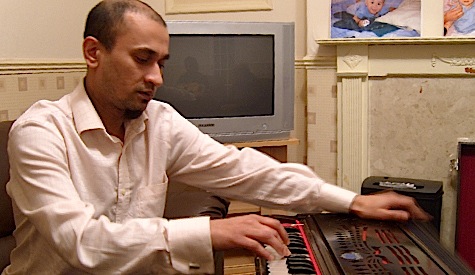
Helal
Helal: তাহলে শুরু করি মায়া গানটা দিয়া?
Ahmed Ali plays the dhol.
বন্দে মায়া লাগাইছে
পিরিতি শিখাইছে
কী যাদু করিয়া বন্দে
মায়া লাগাইছে. . .
Moushumi: কী সুন্দর!
Moyez: গান হোক। গান হোক। বন্ধ হয় নাকি?
H: নতুন একটা গাইতেছি।
Moyez: কার?
H: শামসুর। তুমি কি জানো না আমার কী সুখে দিন যায়।
Moushumi: There is so much emotion in your singing. And it sounds so pure although you’ve lived here all your life. So you really think. . .so it’s possible for you to do this because the community here is really quite rooted. Yes?
Helal: O yes! Absolutely.
M: So, what do you think connects people here with people back in Sylhet? Or with people at home in Bangladesh?
H: Personally, I think it is the music. Because people here, especially the younger generation have moved into the folk scene. Five six years ago if you stopped a 20-year-old Bangladeshi, he would never know what a folk song is. But now there is more awareness. People feel that they can relate to Bangladesh when they listen to a bhatiyali song. Majhi re—when they hear the majhi call, they can picture the land.
M: Maybe these are people who have never even visited home?
H: That’s right. I certainly know a lot of people who have never even visited Bangladesh. But still they listen to folk songs.
M: How come what was not happening 20 [I think I meant 5-6] years ago is happening now?
H: Now music is available through the internet. That is one great thing. Before you recorded an album and sent to India and then it reached UK. But now music is available.
M: Twenty years ago too there must have been a need to connect?
H: There was a need of course. But for that generation it was just work, work and work. But now people have more time. For listening, for practice. For the arts. Now you can also get musicians more easily.
I asked about women; are they also part of the scene. মেয়েরা আছে?
H: British-born, British-based মেয়েরা আছে। আমাদের একটা ফ্রেন্ড আছে, শিরীন, she is originally from Chittagong. If you hear her baul songs, she sings just like they would sing at home. We will get together with her one day.
M: Is this music travelling outside the community?
H: Most definitely. Recently our music somehow reached the Queen of Spain and she has shown interest. There is interest in the mainstream.
M: So are there festivals you are being invited to? What sort of festivals? World music type places?
H: London Festival, it is arranged by Trumann Brewery. It is a big festival. Earlier it was only reserved for the white people, but this time we got invited.
M: এটা কোথায় হয়?
H: Bromley-by-Bow এ একটা বড় brewery আছে। They’ve their own park. পার্কে খুব বড় একটা fire display হইছিল। Fireworks and everything. Normally it is reserved for other musicians. First time we were invited this year.
M: এটা বছরের কোন সময় হয়?
H: Normally it takes place in November.
M: Are you going to try to go to places like WOMAD?
H: We will go if we are invited.But we are more focussed on the community.
M: How would you say your music was different from, say, the Asian Dub Foundation?
H Well, primarily, they [ADF] have less vocals. More drum and bass. Also when they have vocals, it is either in English or some other Indian language. Ours is Bangla. That music is more for clubs.’
M: So is it for the whites mainly?
H: A kind of white. Even Asian white, if you know what I mean.
M: Is it Left liberal then the audience?
H: No, I wouldn’t say that. In England we have a kind of people who are called clubbers. That music is for those who want dance music.
M: Your music is not for clubs?
H: No. We wanted to do something for everyone. Also for the community.
M: Were you in the club scene ever?
H: Yes I was. I was a DJ.
M: Is the Bangladeshi youth scene influenced by the black youth scene?
H: Yes it is. Now we are trying to get out of that somewhat. But not entirely. Bangladeshi rappers—you won’t know they are not black. For our album, we had four rappers; one Bangladeshi, three black. We don’t want to break away from their influence, but want to see if we can create something together. After all, it is the English music scene that first gave us our own music. Bengali things came later for us.
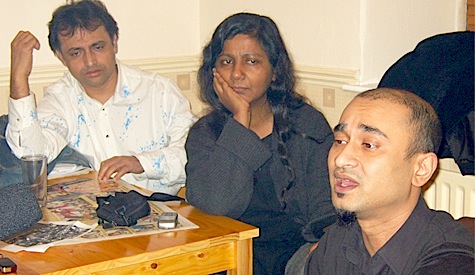
From Left: Moyez, Moushumi, Helal
M: What kind of music would you listen to when you were growing up?
H: Rap.
M: Is that what your generation listened to?
H: Yes:
M: How old are you, by the way?
H: I am 31.
M: Well, let’s have some more music.
H: All my songs are real high scale, বুঝছেন?
M: করেন না আপনি। যত জোরে করার করুন।
H: একদিন, দুইদিন, তিনদিন কইর্য্যা. . .
দোহাই লাগে বন্ধু তুমি আর জ্বালাইয়ো না। — সাজ্জাদ।
M [to Ahmed Ali, asks when he first came to England]: আপনি কবে এসেছেন এই দেশে?
A: In 1978.
M: What do you do here?
A: Now I do nothing. I am retired. Just do music. Have fun. এই দেশে যা দেয় বেশি কিছু না করলেও চলে, চলে যায়। আরো যারা আইছিল, তারা দেশে ঘরবাড়ি করলো কত। কিন্তু হাসন রাজা বলেন, ঘরবাড়ি দিয়া কী হইব? It’s like that.
M: How old are you?
A: 38. I used to do music with Helal’s dad. আমি তখন খুব ছুট ছিলাম। এরা আমারে মারতো। আমি শুনতে শুনতে শিখে গেলাম।
M: কার সঙ্গে প্রথম এসেছিলেন?
A: বাবার সঙ্গে। এখন বাবা নাই। মা আছে। আমাদের সবাই এইখানে। দেশে কেউ নাই। প্রথম দেশে গেছলাম ১৯ বছর পর। তখন কী মাতে বাঙ্গালি কথা বুঝতেই পারি নাই। পরে বুঝলাম। আখন দেশে একবার দুইবার যাই।
M [asks Helal how old he was when he first went to his desh]: হেলাল কবে প্রথম দেশে গেছেন?
H: When I was 17. Now I go once or twice every year. Not just to Sylhet, but all over. Must come to India, to Calcutta, now that we have met.
M [to Ahmed Ali]: Will you play with me?
A: Sure. আমার তো যেইখানে মন লাগে সেইখানে পইড়্যা থাকি। But I can’t play Rabindra, Nazrul, এইসব।
M: আমি রবীন্দ্র নজরুল গাই না। I try like you all. So we can jam together.
H: আমার মন মজাইয়া রে,
দিল মজাইয়া মুর্শিদ
নিজের দেশে যাও। . . .
M: এই গানটা কার?
There is some confusion. Then someone says: বোরহান উদ্দীন। পুরানো গান।
M: কোথা থেকে গান শিখেছেন বেশি?
H: রেকর্ড থেকে। ব্রিক লেনে পাওয়া যায়।
M: আপনার প্রিয় শিল্পী কারা?
H: ক্বারী আমির উদ্দীন, কামাল শাহ, কালা মিয়া, রুহি ঠাকুর, রণেশ ঠাকুর। নূতনদের মধ্যে সাজ্জাদ নূর—he is very good.
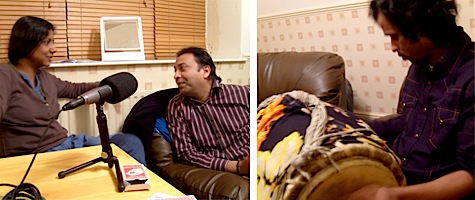
Left: Kaya. Right: Ahmed Ali playing dhol
M: অনুষ্ঠান হয় যে for the community, দেশ থেকে শিল্পীরা আসেন, এইগুলি কোথায় হয়?
H: Brady Centre, York Hall, Stratford. Summer-এ হবে। বৈশাখী মেলা, Brick Lane Fest, London Fest, Mayor’s Fest—এইগুলি সব হবে। These are big. I’m talking twenty, thirty, fifty, sixty thousand people. Indian মেলাও হয়, one in Gunnersbury Park, সেইখানে তো 100,000 people হয়। Now we are getting invited to these festivals.
M: Now you can make a living out of your music?
H: If I chose to, yes. Like Habib has done in Bangladesh. But I do a job.
M: Is Kaya’s background like yours? Is he also working? Is he about your age?
H: Yes. He has a restaurant. He is about Ahmed Ali’s age.
M: Your parents were also struggling with the language, weren’t they? For them they had only one language.
H: Struggling with their jobs, language, they had no time for leisure, for socializing with music. পরে সব settle করার পর, বেশি বয়সে they could do music again.
M: Yet you got your music from your father?
H: Yes, he also played the violin.
M: Does he still sing? Will he sing for us if we go?
M: No and I doubt he will sing now.
[Then we talked about Ruhi Thakur, how he used to sing with Helal’s father. That he was so seriously ill. Perhaps we made his last recording, we told them.]
Helal sings a composition of Dinoheen
ও মনা দুষ দিব আর কারে?
আজ মনার অন্তরে ধরলো গুনে।
Then he sings a song by Kajol Dewan, the same song which we have here.
H: আনুশেহ রা আসছিল, we did a concert together. Docklands-এ। যারা আগে কুন দিন লালন শুনে নাই শুনলো।
M: How is their music different from yours?
H: Audience overlap করে। Students, young people. তারপরেও different somehow. Different styles. That’s the good thing with folk. You can have so many styles.
M: I too work with folk. But I am not rooted like you, nor experimenting like them. Mine’s a private voice. Song of the drifter.
A: রেস্টুরেন্ট-এ কাজ করে, এমন লোক আছে, কাজের পরে, উপরে যাবে, saucepan-এর lid বাজাইলো হয়তো, গান করলো, খুব আনন্দ হয় তাতে। এমন অনেক আশিকান আছে।
–Written in Apr 2014.
Related Link:
Helal Miah with Parapar band members
- Saptiguri, North Bengal. 27 November 2003. Nirmala Roy
- Bolpur, Birbhum. 25 November 2003. Nimai Chand Baul
- Kolkata. 4 September 2019. Purnadas on Nabani Das Baul
- Surma News Office, Quaker Street, East London. 27 February 2007. Ahmed Moyez
- Ambikapur, Faridpur, Bangladesh. 29 April 2006. Hajera Bibi
- Sylhet, Bangladesh. 22 April 2006. Chandrabati Roy Barman and Sushoma Das
- Sylhet, Bangladesh. 21 April 2006. Arkum Shah Mazar
- Sylhet, Bangladesh. 20-21 April 2006. Ruhi Thakur and others
- Jahajpur, Purulia. 27 February 2006. Naren Hansda and others
- Faridpur, Bangladesh. 24 January 2006. Binoy Nath
- Uttar Shobharampur, Faridpur, Bangladesh. 22 January 2006. Ibrahim Boyati
- Baotipara, Faridpur, Bangladesh. 21 January 2006. Kusumbala Mondal and others
- Kumar Nodi, Faridpur, Bangladesh. 21 January 2006. Idris Majhi and Sadek Ali
- Debicharan, Rangpur, Bangladesh 18 January 2006 Anurupa Roy & Mini Roy, Shopon Das
- Mahiganj, Rangpur, Bangladesh. 17 January 2006. Biswanath Mahanta & Digen Roy
- Chitarpur, Kotshila, Purulia. 28 November 2005. Musurabala
- Krishnai, Goalpara, Assam. 30 August 2005. Rahima Kolita
- Chandrapur,Cachar. 28 August 2005. Janmashtami
- Silchar, 25 August 2005, Barindra Das
- Kenduli,Birbhum. 14 January 2005. Fulmala Dasi
- Kenduli, Birbhum. 13 January 2005. Ashalata Mandal
- Shaspur, Birbhum. 8 January 2005. Golam Shah and sons Salam and Jamir
- Bhaddi, Purulia. 6 January 2005. Amulya Kumar, Hari Kumar
- Srimangal, Sylhet. 27 December 2004. Tea garden singers
- Sylhet, Bangladesh. 26 December 2004. Abdul Hamid
- Dhaka, Bangladesh. 24 December 2004. Ali Akbar
- Dhaka, Bangladesh. 23 December 2004. Monjila
- Changrabandha, Coochbehar. 16 December 2004. Abhay Roy
- Santiniketan, Birbhum 27 Nov 2004 Debdas Baul, Nandarani
- Tarapith, Birbhum. 14 October 2004. Kanai Das Baul


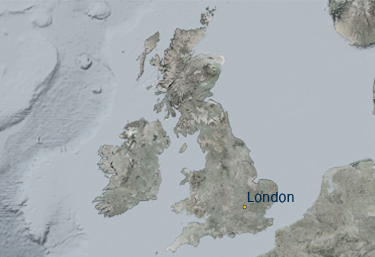
Thank you didi and Sukantho for all your hard work. This is a very good piece of history tha will remind us of our roots.